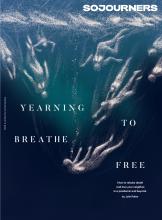WE OFTEN THINK the word “apocalypse” refers to an “end of days” scenario. While that is one usage, it’s incomplete. The Greek root, apokálypsis, is defined as revelation, or an unveiling. It’s often used in prophetic terms, as in the biblical book of Revelation. An apocalypse doesn’t mean destruction so much as laying bare humanity’s underlying truths.
This year, George Miller’s Mad Max: Fury Road, one of the best post-apocalyptic films in a series that helped define the genre, turns 5. Miller’s Mad Max movies are fascinating not just because of their creativity and economical storytelling, but also for how they address the revelatory nature of apocalypse, both in humanity’s sinful nature and its capacity for selflessness.
The Mad Max films happen in a violent wasteland that Miller shows as the direct result of humanity’s greed and recklessness. Fury Road advances that revelation, altering the series’ attitude from cynicism to hope. Fury Road’s message of renewal, and prophetic undertones, makes it a perfect movie for uncertain times.
Read the Full Article

